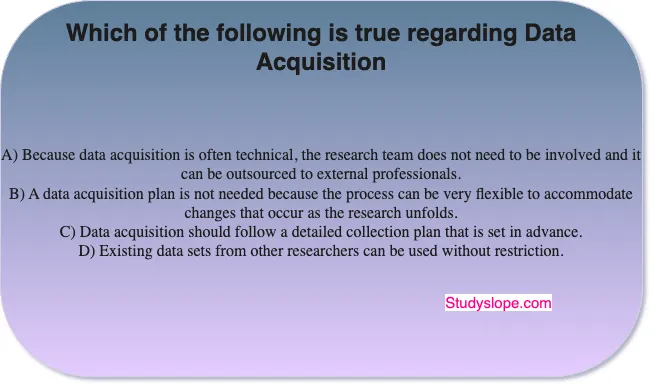Which of the following is true regarding Data Acquisition?
A) Because data acquisition is often technical, the research team does not need to be involved and it can be outsourced to external professionals.
B) A data acquisition plan is not needed because the process can be very flexible to accommodate changes that occur as the research unfolds.
C) Data acquisition should follow a detailed collection plan that is set in advance.
D) Existing data sets from other researchers can be used without restriction.
The Correct Answer for the given question is option C) Data acquisition should follow a detailed collection plan that is set in advance.
Explanation:
For effective data gathering, you must make a detailed collection plan ahead of time. This plan spells out the exact study goals, the kinds of data that are needed, how they will be gathered, and the criteria that will be used to choose or collect the data.
By making a specific plan ahead of time, researchers can:
- Ensure Relevance: The plan makes sure that the data collected directly answers the study questions or aims and that no information is gathered that isn’t needed or isn’t relevant.
- Maintain Consistency: It helps keep data collection methods consistent, which makes sure that the information collected is consistent and reliable.
- Make Good Use of Resources: In terms of time, people, or technology needed for data collection, having a plan in place helps you make better use of your resources.
- Stop Mistakes and Bias: A well-thought-out plan stops mistakes and biases by setting up regular ways to collect data, which lowers the chance of mistakes.
- Adhere to Ethical Rules: This also helps make sure that the process of collecting data follows ethical rules, especially when it comes to data privacy and participant agreement.

